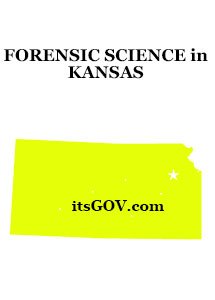Forensic Science
Forensic science combines science and investigation in order to aid and support the prosecution or defense in criminal and civil investigations. While the profession has been widely romanticized by various TV shows, make no mistake – this job is most likely different that you expect. In contrast with popular perception, this is a highly scientific role, which often involves detailed, painstaking work. Field duties are limited to a few areas of expertise, and most often than not a forensic scientist will spend his time in the lab.
If you made it this far, though, congratulations! You’re taking the first steps in joining a very rewarding profession and itsGOV is here to guide you through what you need to know and what you need to do to join a forensic science program in Kansas.
Depending on the type of forensic science practiced, different degrees and educational backgrounds may help a candidate get a job and excel in this field. Regarding formal education, requirements vary across jobs, but you should definitely have a solid background in mathematics, biology and chemistry.
The National Institute of Justice, a division of the U.S. Department of Justice, offers guidelines for model undergraduate and graduate forensic science degree programs. According to the American Academy of Forensic Science, strong programs should offer a curriculum that concentrates on scientific writing, laboratory skills, public speaking, and computer software application training.
Forensic scientists in Kansas collect, preserve, and conduct scientific analyses on physical evidence obtained in the investigation of both criminal and misdemeanor cases. Their work involves performing chemical, analytical, and physical immunological and instrumental techniques and, often times, serving as expert witnesses in court cases.
The Kansas Bureau of Investigation’s (KBI) Forensic Laboratory Division, through its laboratories in Topeka, Kansas City, Pittsburg and Great Bend, serves the local, state and federal law enforcement agencies in the State of Kansas.
From its offices in Topeka, Wichita, Great Bend, Overland Park, and Pittsburg, the KBI employs more than 270 individuals and is headed by a director appointed by the Attorney General.
The KBI’s Forensic Laboratory Division is divided into the following sections:
- Chemistry Section
- Biology Section
- Questioned Document Section
- Toxicology Section
- Latent Print Section
- Firearm and Toolmark Section
- Evidence Control Center
Forensic Science Requirements in Kansas
Candidates learning about how to become a crime scene investigator or forensic scientist in Kansas City can begin by researching the education requirements for their desired position. The Kansas City Police Department employs crime scene technicians – known popularly as CSI agents – and forensic scientists or criminalists as part of its police force, although these professionals are not commissioned officers.
There is a lot of overlap in the general duties and education between CSI agents and forensic scientists in the KCPD, although the CSI agents tend to work more in the field at crime scenes while forensic scientists tend to do more work in the lab. All of the department’s forensic investigators have certain specializations, and candidates who are interested in applying for forensic science and CSI jobs need to meet related degree requirements:
- Bachelor of Science for positions involving:
- Crime Scene Investigation
- Firearms
- Toolmarks
- Photography
- Latent Fingerprints
- Questioned documents
- Bachelor degree in chemistry for positions involving chemistry, such as:
- Substance analysis
- Trace evidence analysis
- Questioned documents
- Bodily fluid analysis
- BS in Biology for:
- Trace analysis of biological materials
- Serology and DNA
- A BS in Genetics or Molecular Biology is preferred for Serology and DNA analysis positions
CSI agents receive additional training in the collection, preservation, and identification of crime scene evidence. As these are the minimum requirements and CSI or forensic scientist jobs in Kansas City are in high demand, it is recommended that candidates also possess additional education and experience.
In the Kansas City area and across the state prospective students will find a variety of colleges and online schools that offer relevant forensic science degrees. There are additional forensic science schools and colleges just across the border in Kansas.
Forensic Science Training in Kansas
Forensic science colleges and universities abound in Kansas, with students able to pursue a number of forensic science programs, including a Bachelor of Science in Forensic Science. This popular degree is designed to prepare students for entry-level work in a forensic sciences laboratory, as it involves study within the context of the criminal investigation and crime detection processes.A Bachelor of Science in Forensic Science includes a strong foundation in chemistry, biology, criminal justice and biological sciences, as well as the forensic sciences.
Individuals who want to learn how to become a forensic scientist in Kansas should first understand the minimum requirements for forensic scientists (often referred to as forensic specialists) working in this state.
In general, all forensic scientists must possess a bachelor’s degree in a science, regardless of the area of forensic analysis. Further, forensic scientists who work as DNA analysts must possess college coursework in biochemistry, genetics, molecular biology, and statistics.
All candidates for forensic scientist jobs can expect to undergo an interview, background investigation, drug screening, fingerprinting, and polygraph test as a condition of hire.
Forensic Science Salary in Kansas
The employment of forensic scientists is increasing in Kansas. According to the Kansas Department of Labor, the amount of forensic scientist jobs is projected to increase by 18.1% in the period from 2010 to 2020.
Sixty forensic science technicians were employed in the state in 2012 based on information provided by the Bureau of Labor Statistics (BLS). They had an annual median salary of $56,760. Experienced professionals in the top tenth percent of their field made $74,410.
In addition to jobs as lab technicians, many of the positions for forensic scientists involve crime scene analysis. Crime scene investigators (CSIs) occupy a variety of different type of positions. Larger departments have specialists in various forensic disciplines such as the processing of latent prints, the analysis of bloodstain patterns, or chemical testing.
Other CSIs document and preserve evidence from the whole crime scene. One crime scene investigator position in Olathe paid from $38,917 to $55,266 a year in 2013.
Forensic Science Schools and Colleges in Kansas
Bachelor’s Degree Programs in Kansas
| University | Fort Hays State University, Forensic Chemistry Concentration B.S. |
| Duration | 24 months |
| Type | Full time, Part time |
| Tuition and fees | $21,448 per year |
| Program link |
| University | Friends University, Forensic Science B.S. |
| Duration | 24 months |
| Type | Full time, Part time |
| Tuition and fees | $24,630 per year |
| Program link |
| University | Newman University, Forensic Science B.S. |
| Duration | 24 months |
| Type | Full time, Part time |
| Tuition and fees | $23,790 per year |
| Program link |
| University | Washburn University, Forensic Chemical Science B.S. |
| Duration | 24 months |
| Type | Full time, Part time |
| Tuition and fees | $22,800 per year |
| Program link |
Master’s Degree Programs in Kansas
There are currently no master’s programs offered in Kansas.




